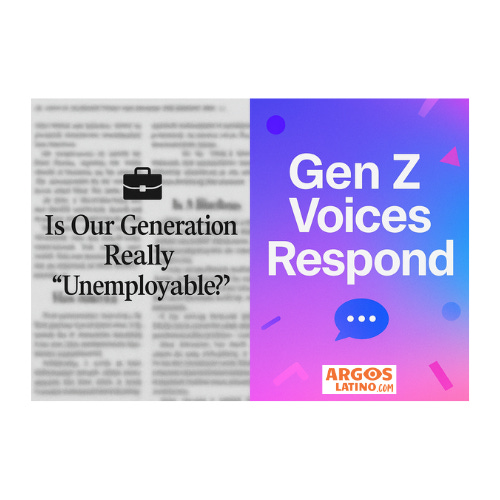Gen Z Responds: Is Our Generation Really “Unemployable”?
Young voices push back on the Wall Street Journal article questioning their work ethic and values.
As editor of Argos Latino, I wanted to hear directly from Gen Z after the Wall Street Journal published the provocative article “Is Gen Z Unemployable?” by Suzy Welch.
Instead of letting others define them, we asked young leaders from this generation to share their own perspectives. These are their voices, in their own words.
Valentina, 23
I actually agree with the article’s perspective, but not in the way it frames Gen Z as unemployable. Our generation has grown up exposed to global crises and cultural tensions, which makes us value pleasure and balance more than traditional work. That doesn’t make us weaker, it makes us want work to feel meaningful and alive. In fact, our push for authenticity and balance has already forced companies to evolve technologically and socially. I see Gen Z as a catalyst for change, pushing employers to reconsider whether productivity should come at the cost of wellness. We are the most technologically advanced and socially connected generation yet, and if companies invest in us, we can help reshape workplace culture for the better.
Yulianna, 24
Instead of framing Gen Z as “unemployable,” I see our generation as redefining what ambition looks like. For me, being a first-generation college student who started working young taught me responsibility and the importance of setting an example. Valuing balance and authenticity doesn’t mean lacking drive, it means shaping success differently. Even during the pandemic, when face-to-face communication was limited, I worked hard to adapt, and I think that adaptability is one of Gen Z’s strongest traits. Employers should recognize that we bring creativity, inclusivity, and new ideas to the table, all while staying committed to making a difference.
Karell, 27
For me, the real challenge isn’t a lack of work ethic in Gen Z, it’s the changing job market. Post-pandemic realities, fierce competition, and the impact of AI have made it harder than ever to enter the workforce. Balance and authenticity aren’t about working less; they’re about surviving and adapting in a system that’s stacked against young professionals. I’ve seen friends send hundreds of applications without results, and many end up in jobs outside their fields of study. This doesn’t mean we aren’t hardworking, it means the system has shifted in ways that undervalue us. That’s why I believe employers should see us as adaptable innovators who bring creativity, motivation, and resilience, even in the toughest conditions.
Juan, 25
When people say Gen Z doesn’t have a strong work ethic, I can’t agree. What gives me the motivation to keep learning and performing is actually balance, time to recharge so I can show up consistently at a high level. Enjoyment and authenticity at work don’t weaken our commitment, they make us more productive and engaged. This mindset helps us avoid burnout and keeps us motivated to contribute meaningfully. For me, valuing work-life balance is not about doing less, but about sustaining the energy to keep doing more, and doing it well.
Lorena, 26
From my perspective, balance matters, but so does respect for your workplace and a solid work ethic. Growing up with my father’s saying, “como haces una cosa, es como la haces con otra,” I learned the value of consistency. As a business owner, I know how hard it is to succeed without seriousness, teamwork, and the drive to always leave things better than you found them. I also believe that enjoying where you work is just as important, because it creates an environment where people feel motivated to give their best. For me, success means combining discipline with faith, leaning on God’s understanding and striving to improve everything I touch.
At Argos Latino, we believe these conversations matter. Gen Z is speaking. Now it’s up to all of us to listen and keep the dialogue open.








